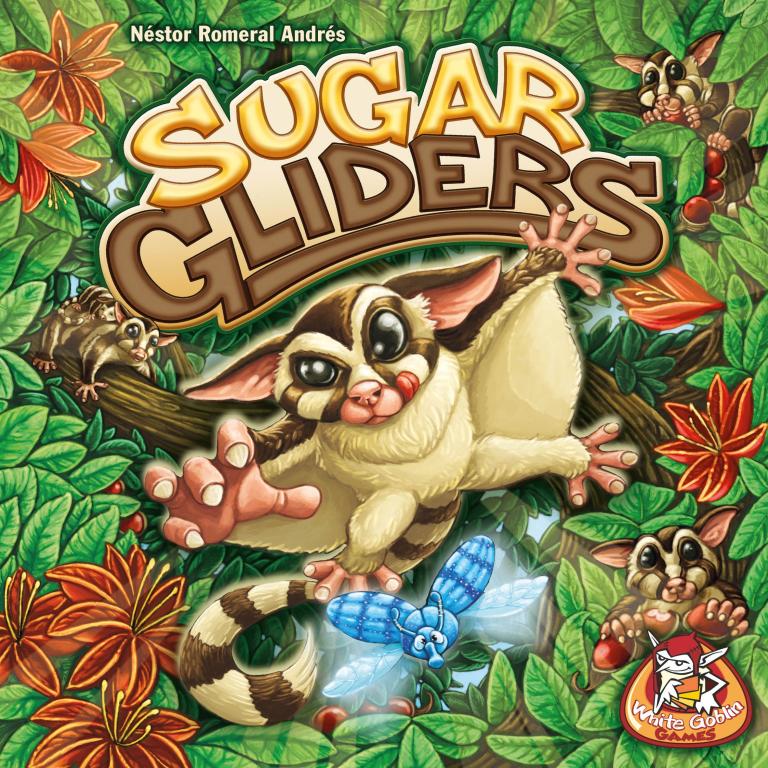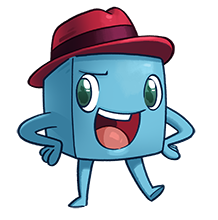Sugar Gliders

Sugar Gliders
Sugar Gliders is a board game for two to four players. Each game lasts around 20 minutes. Each player has a sugar glider, that has to collect as many fruits as possible by jumping from branch to branch.
The sugar glider is a small marsupial that loves nectarous foods. As its name suggests, it’s capable of gliding through the air, much like a flying squirrel.
COMPONENTS
- A board depicting a tree with 61 cells.
- 4 sugar gliders in different colours.
- 60 food tiles in 5 types: 1 fruit, 2 fruits, 3 fruits, 4 fruits, 1 big fruit (5 points).
- A carrying case.
GAME PREPARATION
Each player chooses a player color and takes the corresponding sugar glider.
Leaving the center space empty, randomly distribute the 60 tiles face-up to the 60 other spaces on the tree, 1 per space.
White starts by choosing any space with a white fruit (value 1 tile), and placing his sugar glider on it. The tile in that space will be his ‘jumping tile’. In turn, the other players do the same.
The game can start now. White plays first.
GAME RULES
The game is played in turns, counterclockwise. On your turn, you must either make your sugar glider jump or go into a brief state of torpor:
JUMP
Move your sugar glider in a straight line a number of spaces equal to your ‘jumping tile’ (this means one space in the first turn). If you have no ‘jumping tile’ underneath your sugar glider, you must use one from your reserve. Notice that purple fruits count as 5 movement points.
Then you take the ‘jumping tile’ that you just used, and put it beside yourself face-up. This is your ‘reserve’. If you had no ‘jumping tile’ underneath your sugar glider and had to use a tile from your reserve, discard this tile to the game case; it cannot be used again for the rest of the game.
The tile on which your sugar glider has landed (if any) is your new ‘jumping tile’.
Exceptions:
- The sugar gliders cannot jump outside the tree.
- A sugar glider sitting in the center space can jump to any space on the board by spending any tile from his reserve (no need to match the length of the jump).
- A sugar glider cannot move through another sugar glider.
Example: Anna wishes to make her sugar glider jump, but there is no ‘jumping tile’ underneath her sugar glider. She uses a ‘2’ from her reserve, moves the sugar glider 2 spaces in a straight line, and discards the tile she’s used to the case.
TORPOR
You don’t move your sugar glider. Take the ‘jumping tile’ from underneath your sugar glider (if there is one), and add it to your reserve.
GAME END
The game ends when all the sugar gliders are consecutively in a state of torpor, or when the tree runs out of tiles, whichever happens first.
Each player sums the values of the tiles in his reserve (purple tiles count as 5 points). Highest score wins. In case of a tie, play again.
VARIANT FOR 2 PLAYERS
For shorter 2-player games, discard all the purple fruit tiles and 3 tiles of each other value. Then play on the inner board.
The sugar glider is a small marsupial that loves nectarous foods. As its name suggests, it’s capable of gliding through the air, much like a flying squirrel.
COMPONENTS
- A board depicting a tree with 61 cells.
- 4 sugar gliders in different colours.
- 60 food tiles in 5 types: 1 fruit, 2 fruits, 3 fruits, 4 fruits, 1 big fruit (5 points).
- A carrying case.
GAME PREPARATION
Each player chooses a player color and takes the corresponding sugar glider.
Leaving the center space empty, randomly distribute the 60 tiles face-up to the 60 other spaces on the tree, 1 per space.
White starts by choosing any space with a white fruit (value 1 tile), and placing his sugar glider on it. The tile in that space will be his ‘jumping tile’. In turn, the other players do the same.
The game can start now. White plays first.
GAME RULES
The game is played in turns, counterclockwise. On your turn, you must either make your sugar glider jump or go into a brief state of torpor:
JUMP
Move your sugar glider in a straight line a number of spaces equal to your ‘jumping tile’ (this means one space in the first turn). If you have no ‘jumping tile’ underneath your sugar glider, you must use one from your reserve. Notice that purple fruits count as 5 movement points.
Then you take the ‘jumping tile’ that you just used, and put it beside yourself face-up. This is your ‘reserve’. If you had no ‘jumping tile’ underneath your sugar glider and had to use a tile from your reserve, discard this tile to the game case; it cannot be used again for the rest of the game.
The tile on which your sugar glider has landed (if any) is your new ‘jumping tile’.
Exceptions:
- The sugar gliders cannot jump outside the tree.
- A sugar glider sitting in the center space can jump to any space on the board by spending any tile from his reserve (no need to match the length of the jump).
- A sugar glider cannot move through another sugar glider.
Example: Anna wishes to make her sugar glider jump, but there is no ‘jumping tile’ underneath her sugar glider. She uses a ‘2’ from her reserve, moves the sugar glider 2 spaces in a straight line, and discards the tile she’s used to the case.
TORPOR
You don’t move your sugar glider. Take the ‘jumping tile’ from underneath your sugar glider (if there is one), and add it to your reserve.
GAME END
The game ends when all the sugar gliders are consecutively in a state of torpor, or when the tree runs out of tiles, whichever happens first.
Each player sums the values of the tiles in his reserve (purple tiles count as 5 points). Highest score wins. In case of a tie, play again.
VARIANT FOR 2 PLAYERS
For shorter 2-player games, discard all the purple fruit tiles and 3 tiles of each other value. Then play on the inner board.
Player Count
2
-
4
Playing Time
30
Age
8
Year Released
2012
Newest Review
Remote video URL


